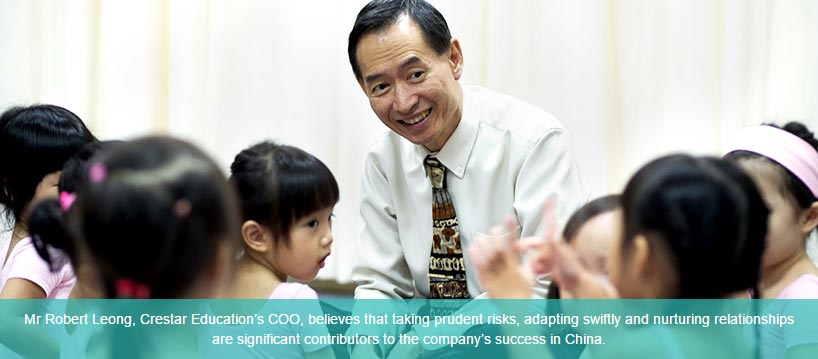(Photos credit and content Author: IE Singapore)
China has been known to be a challenging market for foreign companies. Manoeuvring in it requires a dexterity that eludes many companies even when they have spent considerable time in the country.
Not so for Singapore’s Crestar Education Group, a specialist in infant and childcare services, preschool education and enrichment programmes.
20 years and $5 million later, Crestar has successfully rooted itself in China. It is a well-regarded education service provider among the Chinese community, who are willing to pay top dollar for quality education.
As of 2014, revenue from China accounts for 25 percent of Crestar’s $60 million business revenue. This is 10 times more than its Malaysia and Indonesia business on a combined basis.
Within the next 18 to 24 months, seven more Crestar-branded outfits will take root in China, taking the total to 35.
We picked three lessons from our interview with Crestar that will benefit other companies venturing into China.
1. Take frugal risks
Oxymoronic as it may sound, Crestar has proved it is possible.
Heeding the government’s call to break new ground overseas in the early 1990s, Crestar enthusiastically assessed what China had to offer. However, it had no clue about the Chinese business environment.
Several trade missions later, the team acknowledged: “It’s a good place to be.”
Despite the positive vibe, Crestar opted for a franchise approach instead of a massive direct investment to test the waters. “IE Singapore advocated the franchising mode to reduce our risk and capital outlay. We took the advice because there were IE officers doing extensive work on the ground and we trusted their findings.”
The success of the ‘experiment’ in 1993 encouraged Crestar to take on a 30 per cent stake in its second school (in Changzhou).
“We wanted to further prototype for the Chinese market, so we went in as a JV. Managing the authorities and gaining their trust was a challenge and the local partner could take care of that.
“Also, when a local partner has a greater stake, more effort is made on his end,” said Mr Robert Leong, Crestar Education Group’s COO.
Mr Tay Kee Hong, Crestar’s group financial controller, remembers the third school to be a tipping point: IE helped to facilitate the business matching and establish communication with the local government officials. It also introduced suitable sites. “That turned out to be quite successful”, sparking off a series of nine other schools in the area.”
Today, Crestar holds the majority share in most of its Chinese ventures.
2. Adapt swiftly
Crestar started in China with the intention of catering to the expatriate community. Shortly after, it discovered that the local Chinese market held much more promise. Quick and deft adaptation of the curriculum, without compromising on quality, drew the Chinese crowd in, and Crestar was quickly en route to success.
Nutrition was another area that Crestar was quick to pick up on. “Food is an area Chinese parents pay special attention to. They want to know what comes in and out of the kitchen. From the outside, they take note of what is being delivered to the kitchen. They can tell it is quality,” says Mr Leong, adding that regulators are also regimental about how the kitchen is run.
“In Singapore, our pre-schools seem pretty small in comparison to China, where the kindergarten looks after 300 to 500 students. That’s easily three times our size here. So we need three to four times more cooks. The regulators are also very particular – they want specific kitchen segments, like incoming food zones; where to wash, dry and distribute; storage zones; and cooking zones. The people who handle the washing have to sanitise themselves before they go into the food preparation zone.
“We learn from the process. We share our expertise but we also gain, and we bring the knowledge back to Singapore,” explains Mr Leong.
3. Nurture relationships
On average, Crestar launches two schools in China every year. With each school taking six months to a year to get off the ground, it’s natural to just concentrate on setting it up and forget about networking and building relationships.
Not Crestar.
From the beginning, Crestar has been diligently cultivating relationships. Such efforts have borne fruit over the years.
“When we travel out to different cities, we make it a point to meet the IE representatives on a continuous basis. This is part of our market research – it helps us keep up with in-market developments.
“These meet-ups are a chance for us to see if IE has any relevant business contacts for us. The IE head office is also constantly updated on our business plans, in China as well as other parts of the world. The officers will inform us of any potential leads in any part of the world, and then link us to the opportunities,”says Mr Leong.
Crestar credits 30 to 40 per cent of its Chinese alliances to-date to IE.
IE is not the only party Crestar fosters close ties with. “Local partners, officials and contacts are important to us as well. As we were building up the Crestar brand in China, our partners would approach us with new business opportunities and sites for our schools,” adds Mr Tay.
It was through one of these partners that Crestar was able to open its Beijing branch in 2009 after an arduous ten-year wait.
Advises Mr Leong: “Take time to cultivate a relationship to see if expectations are mutual. Sometimes, potential partners are good but expectations are different. In that case, better not to start something which might break up later.
“We spend a lot of time courting before we enter into a JV.”
Mr Tay chimes in: “We keep close to all our partners. We meet them at least twice a year to find out what’s happening and what they’re doing.”
For more information, please visit https://ie.enterprisesg.gov.sg/Venture-Overseas/SgGoesGlobal/Crestar



